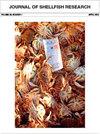盐度对地中海贻贝血细胞功能的影响
IF 1
4区 农林科学
Q3 FISHERIES
引用次数: 0
摘要
盐度波动会对海洋双壳类动物的免疫力产生不利影响;然而,有时实验数据是有争议的。在本研究中,我们评估了短时盐度变化对地中海贻贝(Mytilus galloprovincialis)血细胞功能的体内影响。贻贝适应低盐(6、10、14)和高盐(24、30)条件,并暴露在改变的盐度下2天。然后用流式细胞术和荧光显微镜测量血淋巴细胞组成、血细胞免疫(细胞内活性氧(ROS)产生、吞噬活性)和功能参数(形态学、线粒体膜电位)。盐度波动导致所有实验组血细胞ROS生成增加。除盐度30显著降低外,所有处理的ROS水平升高都伴随着线粒体膜电位升高。盐度胁迫(所有实验组)抑制了粒细胞的吞噬作用,而在盐度14和24时刺激了粒细胞的吞噬活性,表明适度的盐度波动可能对双壳类免疫细胞产生刺激作用。高生理盐水和低生理盐水处理对血细胞形态没有影响。这些结果表明血细胞可能具有恢复低渗肿胀/高渗收缩后初始细胞体积的生理机制。盐度胁迫对双壳类动物血细胞功能的影响程度不同。本文章由计算机程序翻译,如有差异,请以英文原文为准。
Effects of Salinity on Hemocyte Functionality in Mediterranean Mussels (Mytilus galloprovincialis)
ABSTRACT Salinity fluctuations promote adverse effects on the immunity of marine bivalves; however, sometimes experimental data are controversial. In the present work, we evaluated in vivo effects of short-time salinity changes on hemocyte functions of Mediterranean mussel, Mytilus galloprovincialis. Mussels were acclimated to hyposaline (6, 10, 14) and hypersaline (24,30) conditions and exposed to altered salinity for 2 days. Then hemolymph cellular composition, hemocyte immune (intracellular reactive oxygen species (ROS) production, phagocytic activity), and functional parameters (morphology, mitochondrial membrane potential) were measured using flow cytometry and fluorescent microscopy. Salinity fluctuations led to an increase of ROS production by hemocytes in all experimental groups. Increased ROS levels were accompanied with elevated mitochondrial membrane potential for all treatments except salinity 30, where the parameter decreased significantly. Salinity stress (all experimental groups) inhibited phagocytosis in agranulocytes, whereas stimulated phagocytic activity of granulocytes at salinity 14 and 24 indicating that moderate salinity fluctuations may cause stimulating effect on immunocytes of bivalves. Hypersaline and hyposaline treatments did not affect hemocyte morphology. These results indicate that hemocytes likely possess physiological mechanisms that restore initial cellular volume following hypoosmotic swelling/hyperosmotic shrinkage. Salinity stress affects hemocyte functionality of bivalves with varying intensity.
求助全文
通过发布文献求助,成功后即可免费获取论文全文。
去求助
来源期刊

Journal of Shellfish Research
生物-海洋与淡水生物学
CiteScore
2.30
自引率
0.00%
发文量
40
审稿时长
6 months
期刊介绍:
Original articles dealing with all aspects of shellfish research will be considered for publication. Manuscripts will be judged by the editors or other competent reviewers, or both, on the basis of originality, content, merit, clarity of presentation, and interpretations.
 求助内容:
求助内容: 应助结果提醒方式:
应助结果提醒方式:


